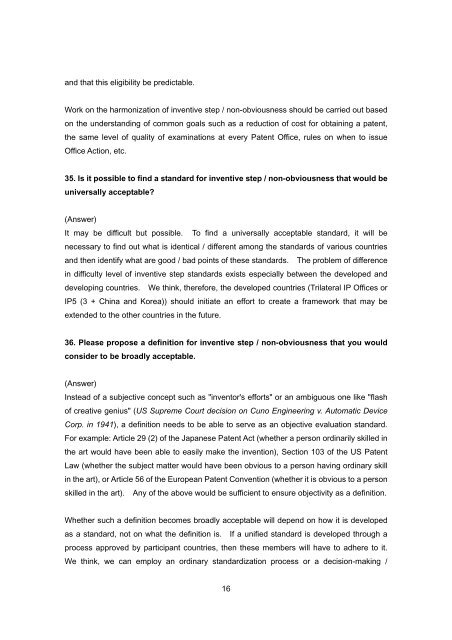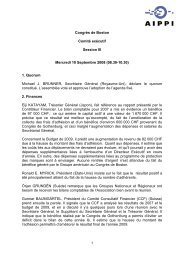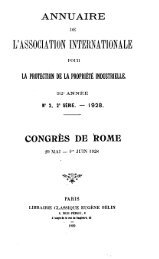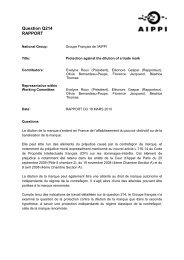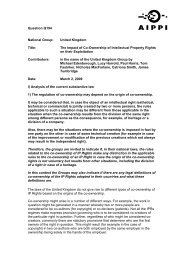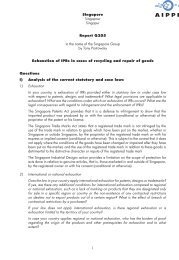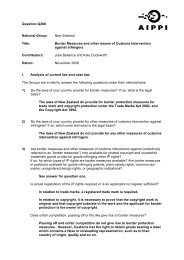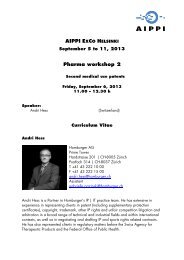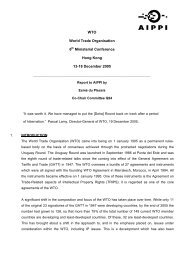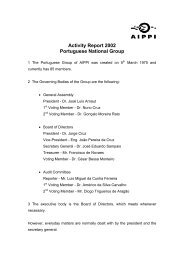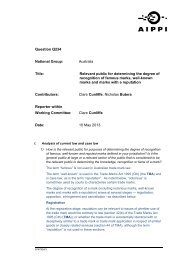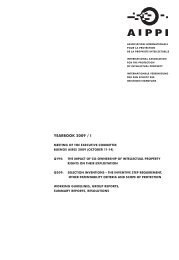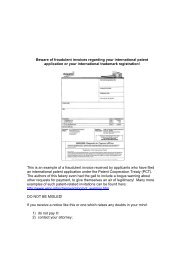Question Q217 - AIPPI
Question Q217 - AIPPI
Question Q217 - AIPPI
You also want an ePaper? Increase the reach of your titles
YUMPU automatically turns print PDFs into web optimized ePapers that Google loves.
and that this eligibility be predictable.<br />
Work on the harmonization of inventive step / non-obviousness should be carried out based<br />
on the understanding of common goals such as a reduction of cost for obtaining a patent,<br />
the same level of quality of examinations at every Patent Office, rules on when to issue<br />
Office Action, etc.<br />
35. Is it possible to find a standard for inventive step / non-obviousness that would be<br />
universally acceptable?<br />
(Answer)<br />
It may be difficult but possible. To find a universally acceptable standard, it will be<br />
necessary to find out what is identical / different among the standards of various countries<br />
and then identify what are good / bad points of these standards. The problem of difference<br />
in difficulty level of inventive step standards exists especially between the developed and<br />
developing countries. We think, therefore, the developed countries (Trilateral IP Offices or<br />
IP5 (3 + China and Korea)) should initiate an effort to create a framework that may be<br />
extended to the other countries in the future.<br />
36. Please propose a definition for inventive step / non-obviousness that you would<br />
consider to be broadly acceptable.<br />
(Answer)<br />
Instead of a subjective concept such as "inventor's efforts" or an ambiguous one like "flash<br />
of creative genius" (US Supreme Court decision on Cuno Engineering v. Automatic Device<br />
Corp. in 1941), a definition needs to be able to serve as an objective evaluation standard.<br />
For example: Article 29 (2) of the Japanese Patent Act (whether a person ordinarily skilled in<br />
the art would have been able to easily make the invention), Section 103 of the US Patent<br />
Law (whether the subject matter would have been obvious to a person having ordinary skill<br />
in the art), or Article 56 of the European Patent Convention (whether it is obvious to a person<br />
skilled in the art). Any of the above would be sufficient to ensure objectivity as a definition.<br />
Whether such a definition becomes broadly acceptable will depend on how it is developed<br />
as a standard, not on what the definition is. If a unified standard is developed through a<br />
process approved by participant countries, then these members will have to adhere to it.<br />
We think, we can employ an ordinary standardization process or a decision-making /<br />
16


